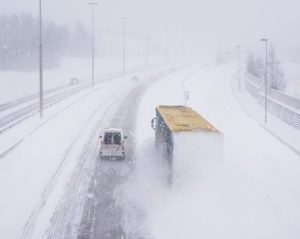
First off, what does a “state of emergency” really mean? A recent news article explains that one purpose of declaring a state of emergency is to urge nonessential personnel from staying off the roads. There’s no precise definition of essential personnel, but the assumption is that it includes law enforcement and emergency responders. You won’t necessarily get a ticket if you don’t fall into either of those categories and decide to venture out. However, it’s easy to see how the roads could be dangerous.
Weather-Related Safety Information
According to the Federal Highway Administration, 22% of all accidents are weather-related. These types of crashes account for an annual average of almost 6,000 fatalities. Close to half a million people suffer injuries each year because of accidents related to snow, ice or rain.
The National Highway Traffic Safety Administration’s Traffic Safety Facts provides some interesting information regarding weather-related accidents. Slick roads are the most common cause of accidents during storms. Of course, visibility is another factor. This can be related to glare, snow or rain. Fallen debris is also a hazard that contributes to automobile collisions when the elements are involved.
If you’re not sure how bad the weather is in the direction you’re headed, you may want to take a look here. A quick review of current New Jersey incident reports shows that a number of roadways are flooded. Trees are down in various sections of the Garden State Parkway and New Jersey Turnpike. There are speed restrictions posted citing weather-related conditions. In short, it’s a mess out there.
Negligence Claims and the Weather
Although the weather may be a contributory factor to some collisions, many accidents have other causes. For example, a driver may have been following too closely for the conditions. A motor vehicle operator could be guilty of distracted driving despite the treacherous roads. Someone might decide to drive while under the influence of alcohol or drugs. Additionally, mechanical issues with brakes or tires may be factors in bad weather accidents. Snow or ice could fly off another vehicle and obstruct vision.
If you are injured in a motor vehicle crash during a storm, it is important to speak with an experienced personal injury lawyer. You should provide the attorney with all information regarding the circumstances of your crash. Make sure to report the incident to the police. Take photographs if possible and get the names of all eyewitnesses.
Contact Us
Were you or a loved one involved in a weather-related automobile accident? The Law Offices of Anthony Carbone can assist you. Contact us to set up an appointment to discuss your claim.